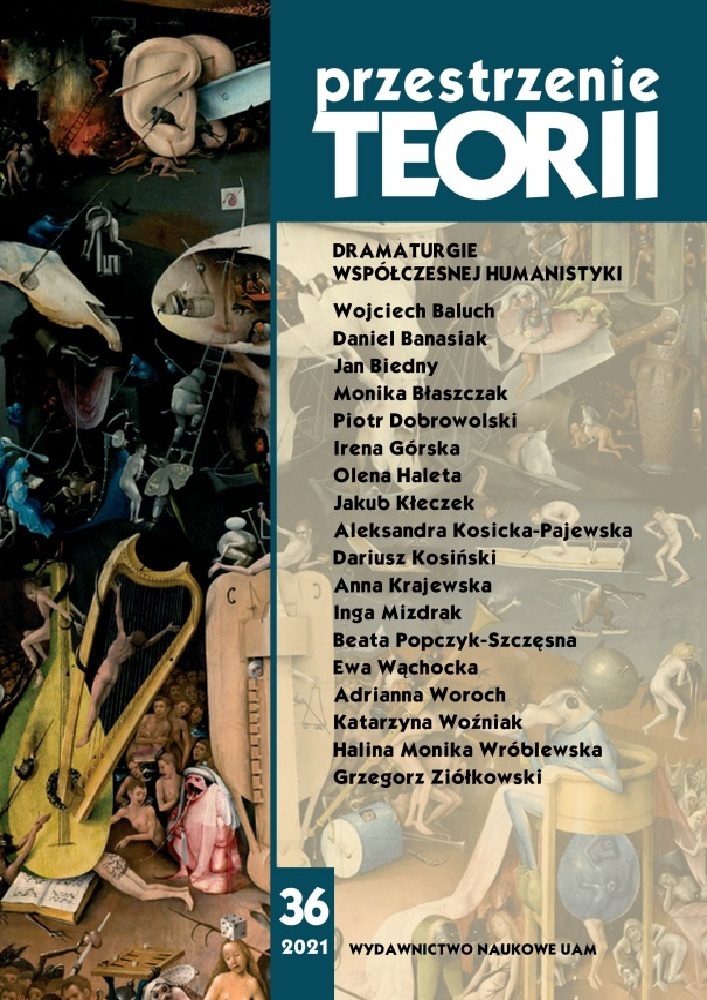Abstrakt
The article opens with a statement that dramaturgical creativity, long marginalized by literary studies, has returned to the area of its interest together with its researchers’ use of the achievements of performative and cultural turns. Taking these into account allows us to treat drama as a distinctive literary practice in which the reception of a text is exemplary. As the author claims, with the New Humanities, integrating scattered reading perspectives known to the history of literary studies into the horizons of New Positivity, dramatic studies enrich this standpoint and maintain a critical view making creative use of the antagonism of perspectives, confrontation of attitudes, conflict of qualities or different visions and ideas. The potential tensions revealed in the practice of active reading of a literary text in accordance with the dramatic matrix guarantee the positive effects of each act of engaged reading. The dramatization of tradition is a specific field of critical dialogue between the reader and the existing literary tradition. Three dramatic works by Jan Czapliński are indicated as examples of mediators for this dialogue. The work of this playwright presents and suggests a critical reading of the characters and works of Gabriela Zapolska, Henryk Sienkiewicz and Adam Mickiewicz, leading to the emancipation of their works that is situated beyond the framework of the discursively created, existing canon of contemporary Polish literature and culture. A critical view enriches and updates the canon. Dramatization, which allows the revaluation of existing values, appears as the basic category of contemporary art – revealing existing, usually ineffable conflicts and using them to build new, positive values.
Bibliografia
Attridge D., Jednostkowość literatury, przeł. P. Mościcki, Kraków 2007.
Barthes R., Przyjemność tekstu, przeł. A. Lewańska, Kraków 1997.
Bielik-Robson A., Nowa Humanistyka. W poszukiwaniu granic, „Teksty Drugie” 2017, nr 1, s. 146–162.
Bolecki W., Słowacki Gombrowicza, „Teksty Drugie” 2010, nr 1–2, s. 171–192.
Burzyńska A., Czy teoria literatury jeszcze istnieje?, „Teksty Drugie” 2006, nr 1–2, s. 40–57.
Burzyńska A., Dekonstrukcja, polityka i performatyka, Kraków 2013.
Cieński M., Nowa Humanistyka i odpowiedzialność za ciągłość (dawnej) tradycji, „Teksty Drugie” 2017, nr 1, s. 235–243.
Czapliński J., Sienkiewicz Superstar (czyli zupełnie spóźniona anegdota biograficzna na chwalebną okazję stulecia odzyskania niepodległości), „Dialog” 2018, nr 12, s. 30–86.
Czapliński J., Zapolska Superstar (czyli jak przegrywać, żeby wygrać), „Dialog” 2016, nr 7–8, s. 5–33.
Iser W., Apelatywna struktura tekstów. Nieokreśloności jako warunek oddziaływania prozy literackiej, „Pamiętnik Literacki” 1980, nr 71/1, s. 259–280.
Janicka A., Sprawa Zapolskiej. Skandale i polemiki, Białystok 2013.
Janicka A., Zapolska ironiczna. Rekonesans, [w:] Ironia modernistów. Studia, red. M. Bajko, U.M. Pilch, J. Ławski, Białystok 2018, s. 171–187.
Koziołek R., Ciała Sienkiewicza. Studia o płci i przemocy, Katowice 2010.
Koziołek R., Humanistyka literaturoznawcza w dobie nowych konfliktów plemiennych. Próba wykonania ruchu, „Teksty Drugie” 2017, nr 1, s. 60–69.
Krajewska A., Dramatyczna teoria literatury. Zarys problematyki, Poznań 2009.
Kulturowa teoria literatury. Główne pojęcia i problemy, red. M.P. Markowski, R. Nycz, Kraków 2006.
Kupryjanowicz M., Kurkowski M., Życie intymne Jarosława, „Dialog” 2020, nr 7–8, s. 10–39.
Kuziak M., W sprawie polityczności polskiej humanistyki, „Teksty Drugie” 2017, nr 1, s. 253–261.
Mitchell W.J.T., Czego chcą obrazy? Pragnienia przedstawień, życie i miłości obrazów, przeł. Ł. Zaremba, Warszawa 2013.
Ratajczakowa D., Sługa dwóch panów: dwoisty żywot dramatu, [w:] Problemy teorii dramatu i teatru, wybór i oprac. J. Degler, t. 1: Dramat, Wrocław 2003, s. 391–400.
Shusterman R., O sztuce i życiu. Od poetyki hip-hopu do filozofii somatycznej, przeł. W. Małecki, Wrocław 2007.
Skwarczyńska S., Zagadnienie dramatu, „Przegląd Filozoficzny” 1949, z. 1–2, s. 102–126.
Skwarczyńska S., Zagadnienie dramatu, [w:] Problemy teorii dramatu i teatru, wybór i oprac. J. Degler, t. 1: Dramat, Wrocław 2003, s. 229–248.
Targoń J., Wirus, strażnik, negocjator, partner… [rozmowa z Bartoszem Frąckowiakiem, Igą Gańczarczyk, Mironem Hakenbeckiem, Magdą Stojowską, Dorotą Sajewską i Szymonem Wróblewskim], „Didaskalia” 2007, nr 77, s. 9–17.
Wojtyszko M., Dowód na istnienie drugiego, „Dialog” 2013, nr 2, s. 60–85.
Licencja
Autorzy
Autorzy tekstów przyjętych do publikacji w czasopiśmie „Przestrzeniach Teorii” są zobowiązani do wypełnienia, podpisania i odesłania na adres redakcji umowy o udzielenie nieodpłatnej licencji do utworów, z zobowiązaniem do udzielania sublicencji CC.
Zgodnie z umową, autorzy tekstów opublikowanych w czasopiśmie „Przestrzeniach Teorii” udzielają Uniwersytetowi im. Adama Mickiewicza w Poznaniu niewyłącznej i nieodpłatnej licencji oraz zezwalą na użycie sublicencji Creative Commons Attribution-NonCommercial-NoDerivatives 4.0 International (CC BY-NC-ND 4.0).
Autorzy zachowują prawa do dalszego, swobodnego rozporządzania utworem.
Autorzy, którzy wykorzystują w swoim tekście cudze utwory (np. ilustracje, fotografie) proszeni są o dostarczenie do redakcji czasopisma zgodę na publikację od uprawnionych podmiotów.
Użytkownicy
Zainteresowani użytkownicy internetu uprawnieni są do korzystania z utworów opublikowanych po 2015 roku „Przestrzeniach Teorii” tylko w calach niekomercyjnych, pod następującymi warunkami:
- uznanie autorstwa - obowiązek podania wraz z rozpowszechnionym utworem, informacji, o autorstwie, tytule, źródle (odnośniki do oryginalnego utworu, DOI) oraz samej licencji;
- bez tworzenia utworów zależnych - utwór musi być zachowany w oryginalnej postaci, nie można bez zgody twórcy rozpowszechniać np. tłumaczeń, opracowań.
Do wszystkich tekstów opublikowanych przed 2015 r. prawa autorskie są zastrzeżone.
Inne
Uniwersytet im. Adama Mickiewicza w Poznaniu zachowuje prawo do czasopisma jako całości (układ, forma graficzna, tytuł, projekt okładki, logo itp.).

